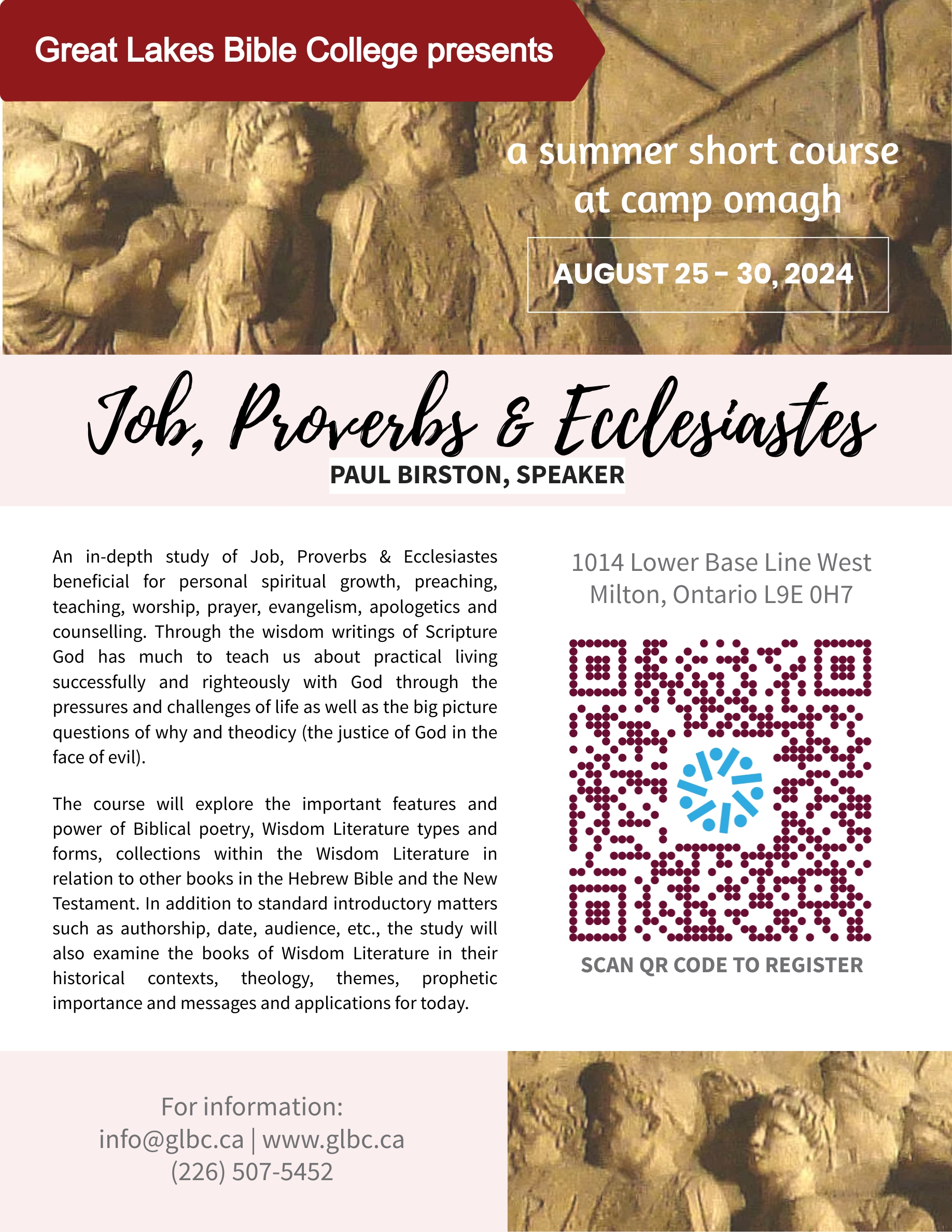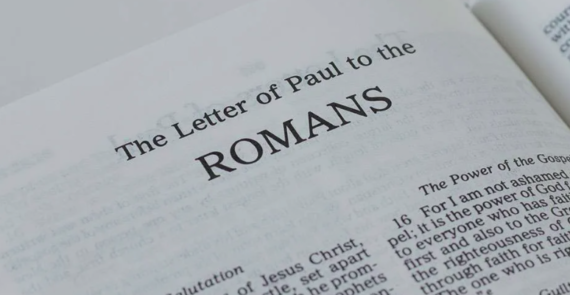A discussion of the righteousness of God – Romans 1:16-17
In our previous two articles, we have considered some reasons why we might be tempted at times…to be ashamed of the Gospel. Included among these were some aspects of the ‘Nature‘ of the Gospel….Things like:
The exclusivity of the Gospel. The fact that God has provided just one, and only one way…to be saved from sin. Some think it is always wrong to say that only one position is right













The gospel calls for the pre-gospel. It requires us to talk about sin – that all people are sinners.
And then there is the fact, that historically, God uses preaching to save people. That tends to come across as weak and stupid. But God uses preaching – because faith is voluntary. We don’t have to stay lost and then again, we don’t have to be saved either. But if we accept salvation, God has only one way to save us.
The kind of faith in Jesus that saves me is the kind that is willing tell others. Some are reluctant to speak up and to speak out. But Paul was not ashamed. He was not ashamed of the nature of the Gospel because it lets us see the world the way that God does.
In our second article we considered the ‘content of the Gospel’. We considered the possibilithy that while someone might not mind the nature of the gospel, they might still be ashamed of the message or content of it.
Paul says…that the gospel of Jesus Christ reveals two things, and that like two sides of a coin, these two things are inseparably linked. Neither makes sense without the other, and neither exists without the other. For the Gospel reveals: the righteousness of God, as well as the wrath of God.
So in our last article, we considered what the gospel reveals about God’s wrath. The O.T. scriptures tell the story of God’s deep displeasure with sin. And in the New Testament, no one spends more time warning of divine punishment than Jesus.
It turnes out that God’s righteousness is the reason for his wrath. God is entirely good and we are not. The Holy One cannot keep company those who are unholy. Our creator will not stand aside and abdicate to the creature. And for that reason, our crimes and his punishment go hand in hand. It makes no sense to talk about being saved without explaining just what it is that we are being saved from.
This brings us to the other side of the coin….to the second of these two things which the Gospel of Jesus Christ reveals.
Paul says:
“For I am not ashamed of the Gospel, for it is the power of God for salvation for everyone who believes, to the Jew first and also to the Greek.
For in it (ie. in the Gospel) the righteousness of God is revealed from faith to faith; as it is written, “But the righteous man shall live by faith”. (Vs.16-19)
There are things about God that are simply not found outside of the gospel. The New Testament suggests, that these things were hidden in ages past, but with the coming of Jesus to this earth, they have been revealed.
James the brother of Jesus wrote about this when he said:
“Every good thing bestowed and every perfect gift is from above, coming down from the father of lights, with whom there is no variation or shifting shadow.
In the exercise of His will he brought us forth by the word of truth that we might be as it were the first-fruits among his creatures” (James 1 :17-18)
Literally, “every good (act of) giving and every perfect gift” comes from above…from the Father.
God is the one who gives perfect gifts in the perfect way. The perfect gift of which James writes is the gift of His own Son…or the gift of salvation through Jesus Christ.
Not only has God given us he gift that is beyond all gifts, but the way in which he has given it cannot be improved upon.
Jesus Christ was God’s full and final revelation of Himself to Mankind. In the perfection of Jesus, sinners find themselves face to face with a holy God. You’ve heard it said that timing is everything.Well in this case it really was. God did not bring us face to face with His righteousness until He had put in place a way for us to be righteousness as he is.
What a terrible thing it would be to see for the first time, the love, the beauty, the holiness of God and at the same time to find no way to approach that holiness. No way to be holy ourselves…leaving us cut off from the one who is perfect. God’s timing was right on. He gives the perfect gift in the perfect way and at just the right time.
This is what Paul was alluding to when he wrote that the Gospel of Jesus Christrevealsthe ‘righteousness of God’. Consider three things that Paul tells us about that.
The Gospel reveals for all time, that the one and only God is also a good. He is righteous instead of evil and constant rather than capricious. God is vindicated by the gospel and all false charges against him must be dropped.
And then, it is the Son of God who reveals the righteousness of God. Not only that but it was His faith that made that revelation possible. Jesus trusted God. Guided by faith, he was perfectly obedient to his Heavenly Father. His sinless life of positive righteousness; condemned sin in the flesh. Thus is was his faith that has led to ours. The righteousness of his faith has made our possible…it is thus from faith to faith.
Then the Gospel declares that this goodness, the righteousness of God and of his Son has been made available to those who believe in Jesus. And it goes on to explain how a righteous person lives a righteous life…”the righteous shall live by faith”.
That is the essence of the Gospel.
Let’s think about these three in the order that they appear in our text. Beginning with the fact that God is revealed in the gospel as both “Good “, and “Righteous”. No single truth about God has been more persistently attacked.
Satan started it by accused God of lying. God has warned Adam and Eve, that in the day that you eat of the tree of the knowledge of good and evil you will surely die. Satan said…that’s a lie. God knows that you will not surely die. He is not to be trusted for he is not good, but evil. And more to the point, he is both selfish and weak…actually afraid. He doesn’t want you to eat from the tree because he does not want you to be like Him. God is just looking out for himself and when you get right down to it, he is the ultimate con-man.
Satan has been playing that broken record…ever since time began. He taught Israel to accuse God of impure motives – of bringing them into wilderness to kill them. So they joined Satan and called God a liar. They said. “You have not brought us into a land flowing with milk and honey, you have taken us out of a land flowing with milk and honey, and now we are stuck.
The problem was that they couldn’t get their hands on God, so they went after His prophets. They tried to kill Moses and Aaron, but God stopped them.
It is not just atheists who attack the goodness of God.Some of the worst attacks come from God’s own people or those who used to be his . What Satan wants to get rid of is the idea that God’s goodness is ‘absolute’ He wants us to choose one of two lesser views of goodness.
The first one concludes that goodness is not real…and the second – that God is not supreme. Here’s how he does that.
Begin with the question: What does it mean anyway, to say that God is good? Maybe it simply means that goodis whatever God is or does. So, if God feeds people with bread from heaven…then, that is good. But if He sends fire from the sky and wipes out sinners, then that’s good too. Both are ‘good’, not because they measure up to a standard, but only because God is the one doing them.
In other words… ‘good is’ whatever God is or does. They are good for no other reason than the simple fact that God is the actor
When you put it that way, it sounds as if goodness is arbitrary. If God is merciful one moment and cruel the next, it’s all good. There is really no objective quality to goodness. It’s as if goodness is just a passing whim or fancy with God.
The second possibility is that God chooses to do certain things because they are good things to do in and of themselves. These good things measure up to an independent standard. So in this case, God chooses the good and rejects the evil based on a standard outside of himself.
But here’s the problem. If you say that there is a standard outside of God, then you are saying that in sense, God operates beneath that standard. He measures His own motives and checks his conduct by that standard. And if that is true then He is not really ‘above the Law’, at all.
If God looks up to a higher standard and judges himself by it, then it cannot be true that He really is supreme. The standard itself is above Him and thus God is not above all.
Now let’s carry that thinking one step further. It is impossible to conceive of an absolute standard that is moral or ethical but which is not personal. So this ‘standard’ must by definition be another ‘person’. In the divine realm, another person is of necessity ‘another god’.
So it turns out that the only way for God to be objectively good is if He is not really supreme at all. The standard that He uses to judge the difference between good and evil – that is what is actually God.
So there you have it, the choice:
- You can have a lesser god who is objectively good because he chooses good over evil based on a standard outside of himself.
- Or you can have an all powerful God for whom goodness is simply whatever he chooses to do. Either way, the God of the Bible does not exist.
As you can see, Satan’s arguments are subtle and powerful, but are not quite honest….and certainly not true. Let’s re-consider those two choices…beginning with the last one first.
It is true, that if,God appeals to a standard outside of Himself, then He is not really sovereign…for that standard would be above Him and He would be subject to it. It is also true that such a standard could not be impersonal, otherwise there could be no accountability. This person above God would therefore really be God in the ‘absolute sense’.
But the bible rejects this possibility – since there is no one above God. And as it turns out, it is not necessary at all to move from God to an outer standard. How is it possible to assign objectivity to the ‘person who acts as q standard’ who exists “above’ God while denying that same objectivity to God himself?
If the standard “above” God can be absolute, personal and objective, then so can God. There is not need to separate the standard from God only to deify the standard while denying deity to God?
The Bible solves the problem for us. It tells us that God does not answer to anyone other than to Himself. He is sovereign in every way. As the sovereign God, and as the standard above all standards, He is still personal whileeternally constant.
Now as we just noticed, in the realm of God, the notion of an impersonal standard is inconceivable. Why would God be obligated to pay attention to an impersonal standard? Such a standard would be ignorant of His choices and powerless to impose itself upon Him.
So the God of the Bible is the personal sovereign God. He is the final court of appeal and the constitution all rolled into one.
Now we have a saying that goes like this: “Absolute power corrupts absolutely”. Whenever anything approaching that kind of power…has been handed over to men, it has corrupted them.
But God is not a man. He is all powerful; but not corrupted by that power. The power of God defines the dimensions of his being in the same way that goodness of God defines His character. But these two are not at war with each other. God is truly good and holy…yet not arbitrarily so. And in Jesus Christ, the man, God has chosen to be the holy person that he has always been.
As our creator, God has the right to judge the world, and will do so in the final day.
There will be wrath and eternal punishment for all who are not saved through faith in Jesus. On the salvation side of the coin, the justice of God has been satisfied by the blood of Jesus Christ. And on the wrath side, justice is equally satisfied. Satisfaction takes the form of eternal punishment. How could a good God who is truly sovereign, do anything less?
Now until the coming of Jesus to this earth, the scriptures affirmed that God is good. But the ultimate demonstration of that truth is found in Jesus Christ. The incarnation forever answers those nagging questions:
- “What would God be like if he had to live as a man?”
- “How well would God do if He had to live ‘under‘ his own righteous standard?”
- Would he always choose good over evil?
The answer to all of those questions is found in the life and death of Jesus Christ. The Gospel of Jesus Christ reveals the righteousness of God. It was the kind of righteousness the proceeded from a life of faith.
When Abraham raised his arm, knife in hand to kill Isaac, God stopped him.
And God said….”now I know that you fear God, since you have not withheld your son, your only son from Me”. The sovereign God of all the world; the God who spoke those words so long ago, has also not withheld from us His Son, His only Son.
All by itself, the incarnation…speaks volumes. When God became a man, He revealed his motives. He did not come into the world to condemn us but to save us. He walked and talked, He ate and He slept….He looked like every other ordinary man. When God came in the flesh, Satan came at Him ‘with the gloves off’. God made no special exemptions for Jesus.
The Hebrew writer says of Him.:
“Since then the children share in flesh and blood, He Himself likewise also partook of the same, that through death He might render powerless him who had the power of death, that is the devil; and might deliver those who through fear of death were subject to slavery all their lives. For assuredly He does not give help to angels, but He gives help to the seed of Abraham.
Therefore He had to be made like his brethren in all things, that he might become a merciful and faithful high priest in things pertaining to God, to make propitiation for the sins of the people. For since He Himself was tempted in that which He has suffered, He is able to come to the aid of those who are tempted. (Heb.2:14-18)
And then he adds in 4:15
For we do not have a high priest who cannot sympathize with our weakness, but one who has been tempted in all things, yet without sin.
There are two ways of looking at the righteousness of Jesus. One of those has Jesus reaching out for and attaining the goodness of God the Father. The other sees him as always God, and only recently Man. Fully Man, but never choosing that which would have contradicted His deity.
So the righteousness of Jesus is on the one hand the same divine righteousness which was always His from eternity. Yet his sinless life is defined by far more than ‘mere’ sinlessness. He was actively and persistently good, obedient in every way.
The cross of Jesus vindicates the eternal motives and goodness of God. In Ephesians chapter one, Paul explains that God loved us before he made us. Before he made us, he counted the cost of saving us from sin, and then he went on and made us anyway. He would not have created us had he been unwilling to go to the cross. Therefore, God in human flesh….is the start of what it means to say that God is Good.
The faith of Jesus produced a holy life. He trusted his heavenly father…who was ‘well pleased’ with the son. His righteous life condemned sin in the flesh so that we can never again use our humanity as an excuse for sin.
The preaching of the Gospel, establishes the righteousness of God once and for all. God intends for Jesus to become the object ofour faith…so that we might share in the righteousness of his Son.
When God declared that men and women are righteous based on faith, he did not make a deal with the Devil. He did not simply ‘defined sin out of existence’. God has dealt with sin – as severely as he can, by sending Jesus to the cross. Those who reject God’s solution, choose instead to pay for their own sins, which they will never finish doing.
Living in eternity as the objects of God’s wrath – does satisfy his anger. But it can never pay back what we owe. And that is precisely, what we all need to be saved from.
When Paul says: “all have sinned and are falling short of the glory of God”, he is not speaking theoretically. It is a terrible fact that no right thinking man or woman can afford to deny.
Jesus came to earth to do more than just prove that God has been right all along. He came so that you and I can change our status and standing before God. He was crucified in Jerusalem to satisfy the demands of the goodness of God, for his goodness can have nothing to do with sin
You see, Jesus died to do two things. He died to remove our sins, making us clean. And he died to transform us into people in whom God himself could live. The good news of the Gospel is that He has done all of that. Jesus finished what God started. And on the strength of the cross and resurrection, He rules in Heaven.
Therefore, we are not ashamed. Not ashamed of the cross, for by it we are saved. Not ashamed of the resurrection, for it is our hope. And not ashamed of our Lord, for he rules forever.

